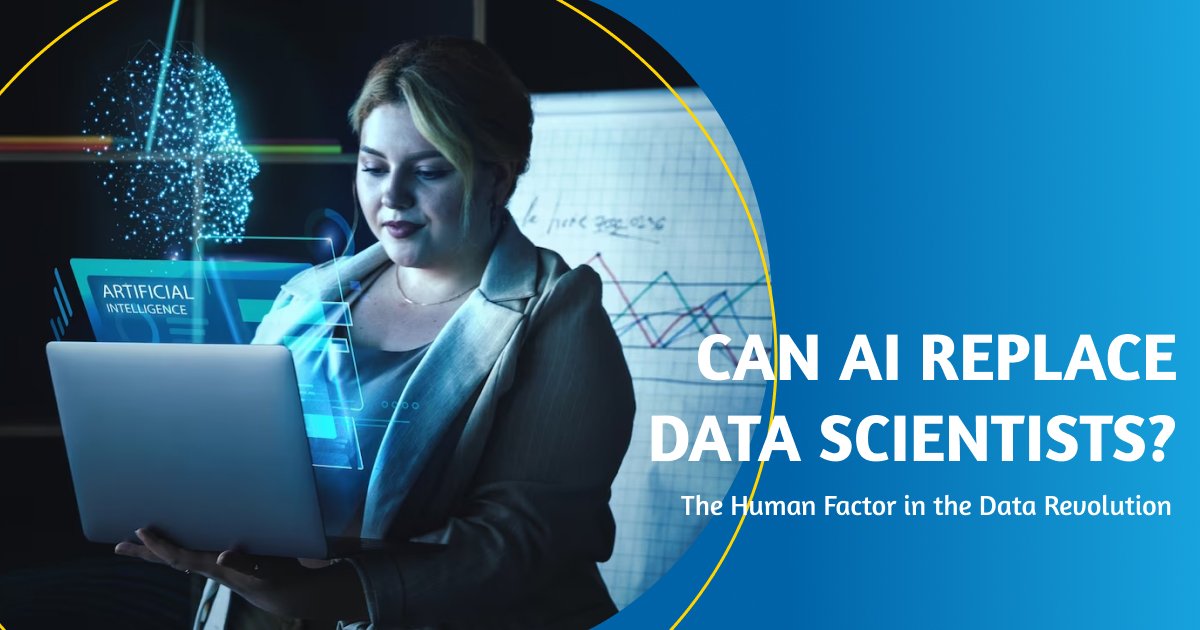
Artificial intelligence (AI) is the buzzword throughout the IT world, everyone has become enthusiastic about it recently. Although AI has accomplished significant accomplishments, it has established itself as a critical component in a number of sectors, bringing about revolutionary change. Automation in the IT industry is one of the finest examples, which according to many, is the cause of enormous layoffs in numerous firms.
In order to achieve better profitability and revenue growth, some of the prominent IT companies across the world have started automating low-skilled jobs. But is it really worth it? In this blog, we have covered everything about ifs and buts related to the replacement of data scientists with AI.
What Is Data Science?
Data science is a vast branch of research that focuses on data structures and procedures with the goal of preserving data collections and extracting value from them. It uses statistical and mathematical tools like as data mining, multidimensional data analysis, and representation, as well as computer science and machine learning, to extract information from data and deliver insights and decision routes. Many organizations have found success in this sector by improving production methods, enabling strategic planning, and innovative product design.
Data scientists are analytic data professionals who possess the technical abilities required to identify data patterns, in addition to industry-specific domain expertise that enables experts to solve difficult business challenges. Most data professionals begin their careers as scientists, statisticians, or data analysts before moving on to professions involving big data, artificial intelligence, or process technology. A knowledgeable data scientist is well-versed in his or her issue area, including which inquiries to ask and the unique characteristics of the data.
Data analysis is the process of studying unprocessed information in order to conclude it. Data analytics is a wide phrase that refers to a variety of strategies for gathering data that may be utilized to enhance operations or improve the overall effectiveness of an organization or system.
What Is Artificial Intelligence?
The field of artificial intelligence includes machine learning, neural networks, and deep learning, which seeks to duplicate human decision-making and cognitive processes. Essentially, AI is a set of mathematical formulas that enable machines to understand complex connections, make meaningful choices, and forecast the future.
AI allows machines to perceive their surroundings and make judgments based on their observations. With an artificial learning element, AI can allow computers to modify their “knowledge” in response to new information.
AI can be utilized to optimize industrial processes, handle biomedical and medical information, create intelligent chatbots, monitor social networks, manage money or investment, and many other domains.
Data Science and AI
For every Data Scientist, Artificial Intelligence is a technique that sits on top of other methods for data analysis.
Why and How Should Data Scientists Evolve?
The skills that data scientists must develop in order to thrive in the age of artificial intelligence. The job of data scientists will change, and they should use AI to construct better prediction models. The upcoming crop of data scientists must get ready to embrace the AI revolution by receiving training in advanced deep learning techniques. Data scientists have taken the same route as software developers, automating smaller-scale operations before progressing to the abstraction level. They should start focusing on higher-level and more complicated activities.
Artificial intelligence and other technologies have the potential to bring about significant developments in the future. Professionals, on the other hand, must constantly be prepared to maintain the greatest degree of competence. Advanced-level data science classes are designed by industry professionals to bring you up to date on the newest skills and approaches.
In Summary
Data science is a multi-step method for evaluating data and extracting insights. It is based on the notion of creating models that employ statistical insights to discover concealed trends and make predictions.
Artificial intelligence uses computer techniques to give the data model autonomy while simulating human cognition and comprehension.
On the path to digital transformation and business 4.0, an increasing number of organizations will use data science, sophisticated data analytics, and artificial intelligence in their development and manufacturing processes in order to enhance efficiency, decrease mistakes, and remain competitive. The technologies and software that make this possible for businesses continue to develop. Methodologies such as predictive analytics, real-time data analytics surveillance, and virtual twins for process management are backed by data analytics methodologies and tools.

